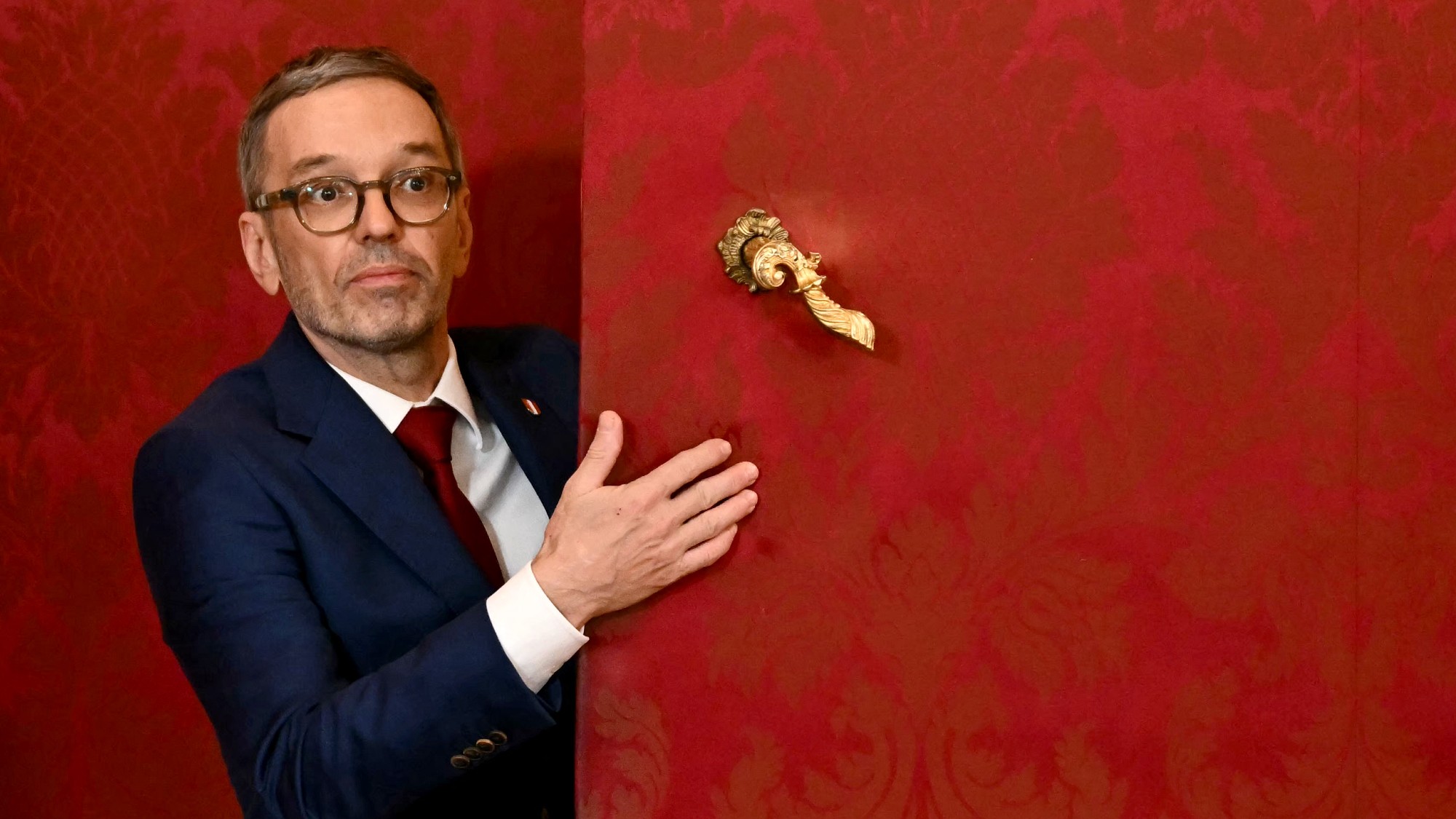Austria's new government: poised to join Putin's gang
Opening for far-right Freedom Party would be a step towards 'the Putinisation of central Europe'

A free daily email with the biggest news stories of the day – and the best features from TheWeek.com
You are now subscribed
Your newsletter sign-up was successful
"Vienna could be about to get its first far-right leader since WWII," said Oliver Noyan on Politico (Brussels). Ever since Herbert Kickl's far-right Freedom Party edged a win in September's legislative elections with 29% of the vote, Austria's centrist politicians have tried to block Kickl from becoming chancellor. Last week, though, negotiations between those mainstream parties collapsed, and Kickl promptly "fired the starting gun" on coalition talks with the centre-right Austrian People's Party (ÖVP).
Kickl, whose party was founded by former Nazis, styles himself as the Volkskanzler ("People's Chancellor"), and has vowed to build a "Fortress Austria" by banning asylum seekers and "remigrating" those already in the country. It's a dark day for Austrian politics, said Michael Völker in Der Standard (Vienna), but mainstream parties like the ÖVP don't "have many options left". If the latest talks fail, there could be another election. Polls suggest the Freedom Party could do even better next time round.
"Chancellor Kickl is not a given," said Thomas Mayer in the same paper. Austria's centrist parties may come to their senses and try a second round of coalition talks, or form a minority government. And even if Kickl does prevail, that doesn't mean he'll succeed. He'll soon realise governing is far harder than campaigning. He won votes on an anti-establishment platform, railing against the EU and lambasting "the system". But as chancellor, he'd be the face of that system, and how he plans to close Austria's gaping €18 billion budget deficit while cutting taxes and protecting social benefits remains "his secret".
The Week
Escape your echo chamber. Get the facts behind the news, plus analysis from multiple perspectives.

Sign up for The Week's Free Newsletters
From our morning news briefing to a weekly Good News Newsletter, get the best of The Week delivered directly to your inbox.
From our morning news briefing to a weekly Good News Newsletter, get the best of The Week delivered directly to your inbox.
Most of his policies will fail on first contact with reality, said Arno Tausch in Kurier (Vienna). His proposal to eliminate social benefits for asylum seekers, for example, won't make it past the Austrian and European courts. And as with all awkward coalitions, it won't be long till the "internal contradictions" between the Freedom Party and the ÖVP burst into the open and end this new government "with a bang".
The real worry is "the Putinisation of central Europe", said The Economist. While Vladimir Putin's closest neighbours in the Baltics see him "for exactly what he is: a murderous revanchist who invades his neighbours", a growing number of central European nations are sympathetic to the dictator. Viktor Orbán, "the strongman of Hungary", has cosied up to the Kremlin and repeatedly attempted to block European sanctions imposed on Russia for its invasion of Ukraine. And "he has a like-minded neighbour" in Robert Fico of Slovakia, while in the Czech Republic another pro-Russia eurosceptic is leading the polls. How chilling that Austria, too, is on the brink of being led by a Putin sympathiser who wants to cut aid to Ukraine. Kickl joins a growing gang, but his rise "will delight only the autocrats".
A free daily email with the biggest news stories of the day – and the best features from TheWeek.com
-
 What is the endgame in the DHS shutdown?
What is the endgame in the DHS shutdown?Today’s Big Question Democrats want to rein in ICE’s immigration crackdown
-
 ‘Poor time management isn’t just an inconvenience’
‘Poor time management isn’t just an inconvenience’Instant Opinion Opinion, comment and editorials of the day
-
 Bad Bunny’s Super Bowl: A win for unity
Bad Bunny’s Super Bowl: A win for unityFeature The global superstar's halftime show was a celebration for everyone to enjoy
-
 Democrats push for ICE accountability
Democrats push for ICE accountabilityFeature U.S. citizens shot and violently detained by immigration agents testify at Capitol Hill hearing
-
 Fulton County: A dress rehearsal for election theft?
Fulton County: A dress rehearsal for election theft?Feature Director of National Intelligence Tulsi Gabbard is Trump's de facto ‘voter fraud’ czar
-
 ‘Melania’: A film about nothing
‘Melania’: A film about nothingFeature Not telling all
-
 Vietnam’s ‘balancing act’ with the US, China and Europe
Vietnam’s ‘balancing act’ with the US, China and EuropeIn the Spotlight Despite decades of ‘steadily improving relations’, Hanoi is still ‘deeply suspicious’ of the US as it tries to ‘diversify’ its options
-
 Greenland: The lasting damage of Trump’s tantrum
Greenland: The lasting damage of Trump’s tantrumFeature His desire for Greenland has seemingly faded away
-
 Minneapolis: The power of a boy’s photo
Minneapolis: The power of a boy’s photoFeature An image of Liam Conejo Ramos being detained lit up social media
-
 The price of forgiveness
The price of forgivenessFeature Trump’s unprecedented use of pardons has turned clemency into a big business.
-
 Reforming the House of Lords
Reforming the House of LordsThe Explainer Keir Starmer’s government regards reform of the House of Lords as ‘long overdue and essential’